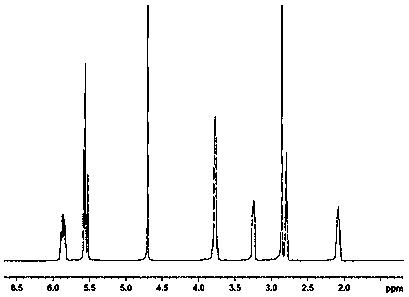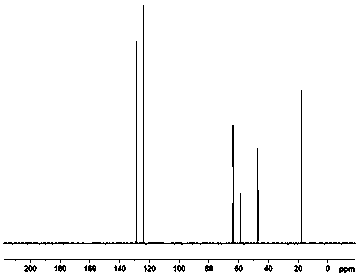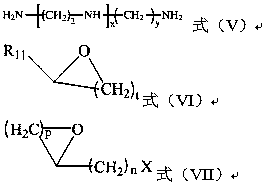A kind of viscosifier copolymer association for drilling fluid and preparation method thereof
The technology of an associate and a tackifier is applied in the field of polymer for drilling fluid and its preparation, which can solve the problem of no obvious improvement in salt resistance and calcium resistance, and achieve the effect of high temperature and salt resistance.
- Summary
- Abstract
- Description
- Claims
- Application Information
AI Technical Summary
Problems solved by technology
Method used
Image
Examples
Embodiment 1
[0068] Weigh 170g MAPS, 100g AM and 100g cornstarch respectively for later use, then weigh 6730g deionized water and 1758g NaCl respectively to prepare NaCl solution, and divide the solution into two equal parts. Add cornstarch to a part of NaCl solution and gelatinize at 80°C for 30min, 2 After 30 min, 3.7 g of potassium persulfate was added, and then AM and MAPS were added to the remaining part of the NaCl solution, dissolved and transferred to gelatinized starch, and reacted at 65°C for 2 h to obtain an intermediate product. Then, 140 g of cationic polyamine 1 was dissolved in 300 g of deionized water to prepare a cationic polyamine solution, and then the cationic polyamine solution was added to the intermediate product, mixed evenly, and the temperature was raised to 75°C at the same time, and the reaction was continued for 4 hours. A precipitate was obtained by washing with acetone, and the precipitate was dried at 70° C. for 12 hours and then pulverized to obtain a graf...
Embodiment 2
[0070] Weigh 150g MAPS, 80g AM and 100g potato starch for later use. Then weigh 2870g deionized water and 330g CaCl 2 Formulated as CaCl 2 solution, the solution was divided into two parts with a volume ratio of 6:4. Add potato starch to one more part of CaCl 2 The solution was gelatinized at 70°C for 30min, and N 2 After 30min, add 1.7g sodium persulfate, then add AM and MAPS to the remaining CaCl 2 After the solution was dissolved, it was transferred to a gelatinized starch reactor, and an intermediate product was obtained after reacting at 70° C. for 1.5 h. Then, 30 g of cationic polyamine 2 was dissolved in 100 g of deionized water to prepare a cationic polyamine solution, and then the cationic polyamine solution was added to the intermediate product, mixed evenly, and the temperature was raised to 80° C., and the reaction was continued for 3 hours. The precipitate was washed with acetone. The precipitate was dried at 80°C for 12 hours and then pulverized to obtain ...
Embodiment 3
[0072] Weigh 130g MAPS, 120g AM and 100g potato starch respectively for later use. Then weigh 1785g deionized water and 105g AlCl 3 Formulated as AlCl 3 solution, divide the solution into two equal parts. Add potato starch to a portion of AlCl 3 The solution was gelatinized at 60°C for 30min, and N 2 After 30min, add 5.3g ammonium persulfate, then add AM and MAPS to the remaining part of AlCl 3 After the solution was dissolved, it was transferred to a gelatinized starch reactor, and the intermediate product was obtained after reacting for 2 hours at 60°C. Then, 60 g of cationic polyamine 3 was dissolved in 200 g of deionized water to prepare a cationic polyamine solution, and then the cationic polyamine solution was added to the intermediate product, mixed evenly, and the temperature was raised to 70°C at the same time, and the reaction was continued for 4 hours. The precipitate was washed with acetone. The precipitate was dried at 80°C for 12 hours and then pulverized ...
PUM
| Property | Measurement | Unit |
|---|---|---|
| shear viscosity | aaaaa | aaaaa |
| thermal resistance | aaaaa | aaaaa |
Abstract
Description
Claims
Application Information
 Login to View More
Login to View More - R&D
- Intellectual Property
- Life Sciences
- Materials
- Tech Scout
- Unparalleled Data Quality
- Higher Quality Content
- 60% Fewer Hallucinations
Browse by: Latest US Patents, China's latest patents, Technical Efficacy Thesaurus, Application Domain, Technology Topic, Popular Technical Reports.
© 2025 PatSnap. All rights reserved.Legal|Privacy policy|Modern Slavery Act Transparency Statement|Sitemap|About US| Contact US: help@patsnap.com



